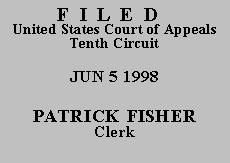 UNITED STATES COURT OF APPEALS
UNITED STATES COURT OF APPEALS
 UNITED STATES COURT OF APPEALS
UNITED STATES COURT OF APPEALS
TENTH CIRCUIT
| LOUIS C. FANNON, | |
| v. | No. 98-3068 |
| CHARLES E. SIMMONS, Secretary
of Corrections; NOLA FULSTON, District Attorney, |
(D.C. No. 98-3027-DES)
(D. Kan.) |
ORDER AND JUDGMENT(*)
Before BALDOCK, EBEL, and MURPHY, Circuit Judges.(**)
This matter is before the court on Petitioner-Appellant Louis C. Fannon's application for a certificate of appealability under 28 U.S.C. § 2253. Fannon seeks to appeal the district court's dismissal of his 28 U.S.C.. § 2254 petition for a writ of habeas corpus. Because we conclude that Fannon has failed to make a substantial showing of a denial of a constitutional right as required by § 2253, we deny his application and dismiss the appeal.
Fannon, an inmate at the Lansing Correctional Facility in Lansing, Kansas, seeks an immediate release from prison as well as damages for alleged violations of his constitutional rights. Fannon states that he is a witness in two state capital murder trials, and claims officials have failed to provide for his safety in confinement. The district court dismissed Fannon's habeas petition (while also noting that damages were not available to him under § 2254) without prejudice for failure to exhaust state administrative and judicial remedies. See id. § 2254(b)(1)(B).
A petitioner convicted of a state crime may not appeal a federal district court's denial of habeas corpus relief unless the district court or court of appeals grants a certificate of appealability. Id. § 2253(c)(1)(A). We will not grant such a certificate unless "the applicant has made a substantial showing of the denial of a constitutional right." Id. § 2253(c)(2); see also Hogan v. Zavaras, 93 F.3d 711, 712 (10th Cir. 1996).
The district court properly dismissed without prejudice Fannon's claim for damages under § 2254. "In the case of a damages claim, habeas corpus is not an appropriate or available federal remedy." Preiser v. Rodriguez, 411 U.S. 475, 494 (1973) (emphasis in original). We likewise conclude the district court properly dismissed without prejudice Fannon's claim for release based upon officials' alleged indifference to his safety.
A state prisoner is entitled to relief under § 2254 "only if he is held 'in custody in violation of the Constitution or law or treaties of the United States.'" Engle v. Isaac, 456 U.S. 107, 119 (1982). Fannon's claim that officials have not provided for his safety in prison does not question the validity of his custody under his original judgment and sentence for theft. Rather, his claim challenges the conditions of his confinement, which is more properly cognizable under 28 U.S.C. § 1983. See Northington v. Marin, 102 F.3d 1564, 1567 (10th Cir. 1996) ("Prison officials are liable under the Eighth Amendment for denying an inmate humane conditions of confinement if the officials know of and disregard a substantial risk of serious harm to the inmate.").
In any event, we are satisfied that at this point Fannon has failed to make a substantial showing of a denial of a constitutional right as required for issuance of a certificate of appealability under § 2253. In his petition, Fannon expresses concern for his safety and nothing more. As of yet his fears are just that--fears. Concern for one's safety without more, however, does not rise to a constitutional violation. See Moore v. Marketplace Restaurant Inc., 754 F.2d 1336, 1349-50 (7th Cir. 1985) (fear for one's safety does not constitute a constitutional violation).
APPEAL DISMISSED.
Entered for the Court,
Bobby R. Baldock
Circuit Judge
*. This order and judgment is not binding precedent, except under the doctrines of law of the case, res judicata, and collateral estoppel. The court generally disfavors the citation of orders and judgments; nevertheless, an order and judgment may be cited under the terms and conditions of 10th Cir. R. 36.3.
**. After examining the briefs and appellate record, this panel has determined unanimously that oral argument would not materially assist the determination of this appeal. See Fed. R. App. P. 34(a); 10th Cir. R. 34.1.9. The case is therefore ordered submitted without oral argument.